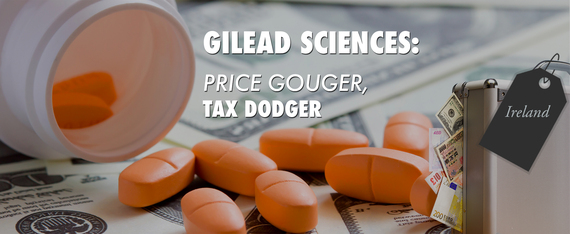If you think the pharmaceutical industry has stolen all it can from the American people through its price gouging, think again. Even as they're pricing medications as high as the market can bear and beyond, drug corporations are getting big taxpayer subsidies and then dodging taxes on the resulting huge profits.
They are robbing us blind of the vital revenues we need to hire teachers, fix roads, protect the environment and shift into a clean and renewable energy economy.
A recent report from Americans for Tax Fairness reveals a particularly blatant example of this triple theft. Gilead Sciences, maker of hepatitis drugs that debuted at a thousand dollars a pill - and partly discovered through federal research grants - has paid little in U.S. taxes as its profits have soared.
Hepatitis C (the type Gilead's drugs treat) is a terribly debilitating disease that causes liver failure and liver cancer. It is particularly widespread among older Americans, veterans, prisoners, and the poor. That means a big part of the drug's costs are paid by public health programs. Medicare, Medicaid and the Veterans Affairs department have seen their drug costs explode, forcing them to deny treatment to hundreds of thousands of sufferers.
Meanwhile, over the first two years of its hepatitis C drug sales, Gilead's revenues tripled, to nearly $33 billion, and its profits jumped five-fold, to almost $22 billion. But the company's tax payments went in the opposite direction: its worldwide effective tax rate dropped by 40%.
How? Gilead has been shoveling all those profits made off hepatitis sufferers and American taxpayers into offshore tax havens, where they've been taxed at about a 1% rate.
In fact, over the past few years, Gilead has shifted more profits offshore--some $20 billion--than almost any other big American company. The firm now holds over $28 billion in earnings overseas, on which, thanks to a massive tax loophole known as "deferral," it can indefinitely delay paying U.S. taxes. That unpaid bill is nearly $10 billion.
The ATF report provides some galling twists to this already outrageous story.
Not only did the developers of Gilead's hepatitis C drugs receive millions of dollars in government research grants, but the driving force behind the discovery was a nearly full-time federal employee--of the Veterans Affairs department, no less. Despite all this public support, the drug was privately patented and that key researcher walked off with a $400 million payday when it was sold to Gilead.
Thanks to all the stock and stock options he received as the company's stock price shot up on its hepatitis-drug windfall, Gilead's CEO became a billionaire.
He wasn't the only one getting super-rich fast. Over the last 10 years, Gilead spent more enriching shareholders' portfolios through stock buybacks than it did improving patients' lives through new drug research. So the next time a drug corporation claims it needs to charge you an arm and a leg to find the next great medical cure tell it to take a chill pill.
The ATF report also offers some solutions. The federal government has the power to break Gilead's patent and ensure its hepatitis drugs are available to all who need them. It just has to pay a reasonable price for them - which is a fraction of what Gilead is charging.
And the deferral tax loophole that lets big corporations decide when or if they pay U.S. taxes on offshore profits, should be closed. Those two reforms would go a long way to preventing future thefts of the American people by the drug industry.

